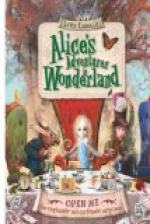|
|
Alice in Wonderland Topic Tracking: Knowledge
Knowledge 1: Again and again throughout the book, Alice repeats the lessons she's learned in school--either because she feels the need to test herself, to practice, or because someone she meets wants to hear the lessons she's learned. As she falls, she tries to apply her lessons to her present situation, but they don't seem particularly useful. She repeats long words she doesn't quite understand ("latitude" and "longitude") and words that she knows aren't quite right.
Knowledge 2: Here Alice exercises her book learning. She remembers typical children's stories that teach lessons by recounting the misfortunes of foolish children who don't know the proper things to do. Wisely, Alice checks to make sure that the bottle marked "DRINK ME" is not also marked "poison."
Knowledge 3: Alice tries to find out if perhaps she has turned into another little girl by testing her knowledge. She is worried that perhaps she turned into her friend Mabel, who is not too bright. First Alice tries to recite the multiplication tables, but they come out wrong, and then she attempts to recall her geography and poetry--both of which also lead to failure. Based on her inability to prove to herself that she knows her lessons, Alice fears that she has indeed become a different stupid child.
Knowledge 4: When Alice grows as big as a house, she worries that since she's grown as large as she possibly can, she may never grow any older. If she doesn't grow to be an adult, then she will have to learn lessons forever. To Alice, an important distinction between children and grown-ups is that children have a lot to learn and are always being subjected to some educational exercise while adults apparently don't have to learn anything.
Knowledge 5: For Alice, her knowledge is a major touchstone for proving whether or not she is the same little girl that she used to be. When the Caterpillar asks her how she can be sure that she has changed, she explains that she can no longer recite poems the way that she learned them. As proof, she recites "You are old, Father William," which is a strange parody of a real poem a nineteenth-century child might have learned.
Knowledge 6: Alice often becomes frustrated by her encounters with the creatures of Wonderland because many of them tend to contradict her or tell her that she is wrong or that she doesn't know what she is talking about. She gets annoyed at the Caterpillar when she expects him to know and understand what her experiences have been, but he insists that he doesn't know what she is talking about. Other characters Alice meets expect her to know certain things that she, having had different experiences, has no way of knowing.
Knowledge 7: The Duchess assumes Alice is quite ignorant when she discovers that Alice doesn't know that all cats can grin and that most of them do. She tells Alice, "You don't know much...and that's a fact." (Chapter 6, pg. 39).
Knowledge 8: In an effort to show the Duchess how intelligent she is, Alice tries to demonstrate why one of the Duchess' morals is flawed. Pleased to have an opportunity to show off her knowledge, Alice starts to give the Duchess a lesson in astronomy. (The Duchess is not the least bit interested in learning from Alice and threatens to have her killed.)
Knowledge 9: The Mock Turtle and the Gryphon, both nostalgic for their school days, emphasize the importance of a proper education. They are shocked at Alice's lack of knowledge about basic elements of their educational system and about life under the sea. Both of them tell Alice that she is quite stupid.
Knowledge 10: In the course of relating her adventures, Alice tells the Gryphon and the Mock Turtle that she has been unable [unable to do what?? This is unclear]. The two creatures are intrigued and tell her to recite a poem. Alice does, even though she is beginning to get annoyed that everyone in Wonderland is always making her repeat her lessons. Once again, what Alice recites is not the poem she once knew.
Knowledge 11: At the Knave's trial, Alice learns the meaning of "suppressed," a word she had often wondered about. Carroll takes great care to explain the meaning to the reader as well. In Wonderland, if someone is disruptive at a trial, he is suppressed by being stuffed into a sack and sat upon. This is one of the only lessons Carroll takes great care to teach the reader directly, and one of the only lessons that Alice comments on learning.




